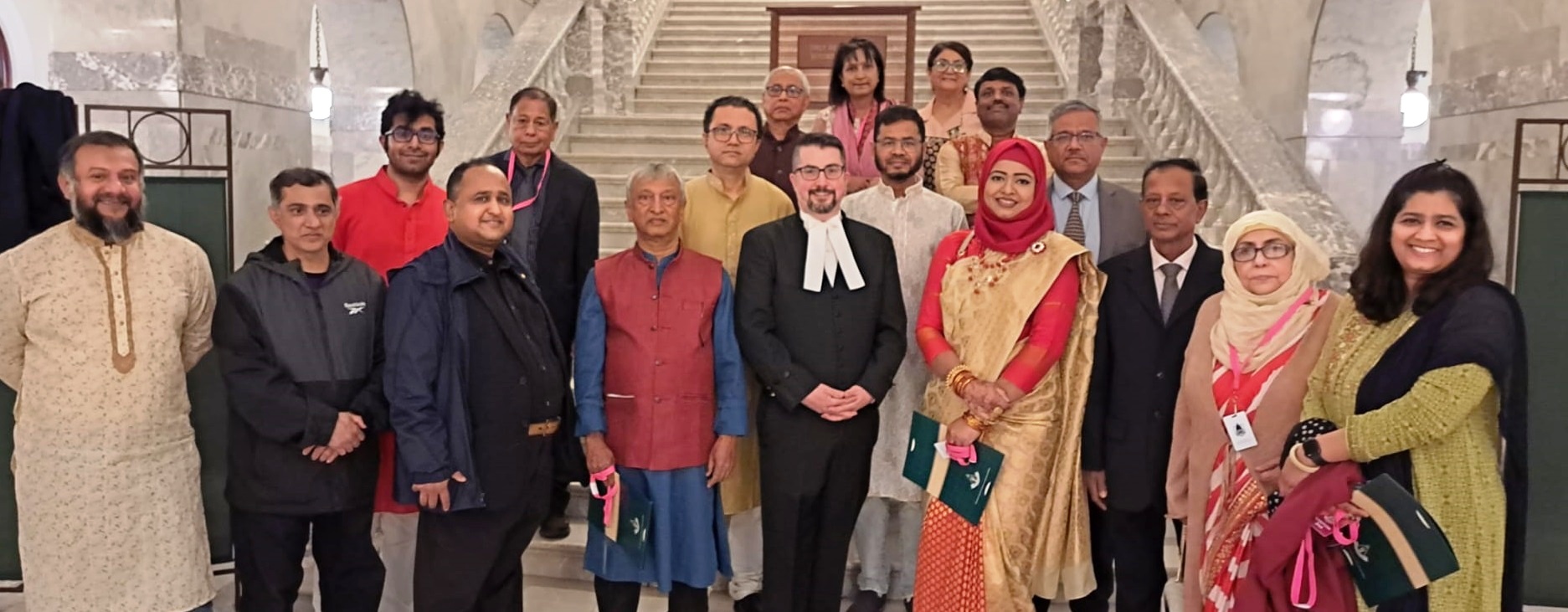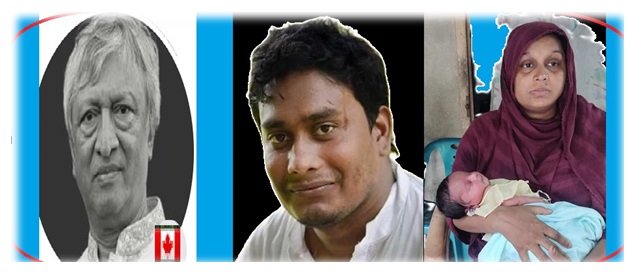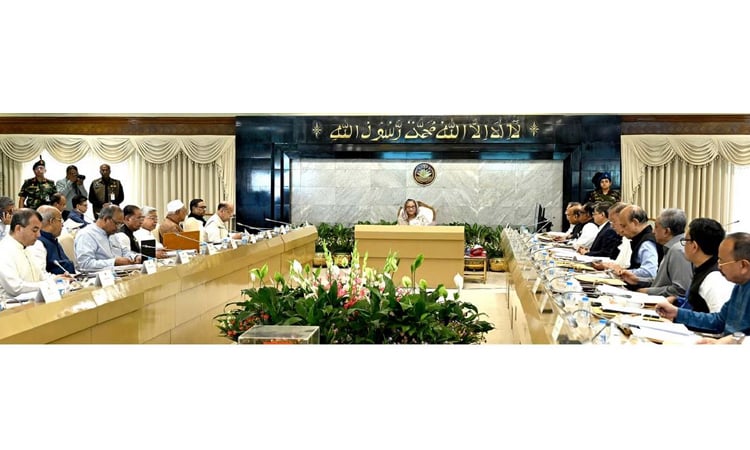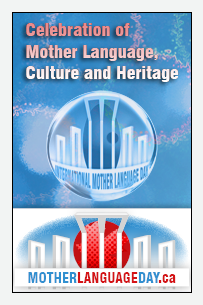Requirements not met
Your browser does not meet the minimum requirements of this website. Though you can continue browsing, some features may not be available to you.
Browser unsupported
Please note that our site has been optimized for a modern browser environment. You are using »an unsupported or outdated software«. We recommend that you perform a free upgrade to any of the following alternatives:
Using a browser that does not meet the minimum requirements for this site will likely cause portions of the site not to function properly.
Your browser either has JavaScript turned off or does not support JavaScript.
If you are unsure how to enable JavaScript in your browser, please visit wikiHow's »How to Turn on Javascript in Internet Browsers«.
Samajkantha News is a sister media of Doinik Ekattorer Chetona.
Language / ভাষা:
Country News
Alberta Cultural Calendar Recognizes April 14 as Bengali New Year
- Details

Edmonton, Alberta (DEC News) The Alberta Parliament in Edmonton, the capital of Alberta, became a vibrant hub of cultural exchange as it celebrated the Bengali New Year with dignity and enthusiasm on April 16, 2024
. The event marked a significant moment in Alberta’s cultural calendar, resonating with the rich traditions of Pohela Boishakh.
Mob Justice: Law Enforcement in Bangladesh as a Silent Spectator to Injustice and Jungle Law
- Details

Mob Justice: Law Enforcement in Bangladesh as a Silent Spectator to Injustice and Jungle Law
By Delwar Jahid
Mob justice, or vigilantism, refers to instances where groups of people take the law into their own hands to punish those accused of crimes, bypassing legal procedures and due process. In Bangladesh, this practice has become increasingly concerning, particularly since the student-led protests in August 2024. These protests have drawn widespread attention to issues of security, governance, and public accountability.
This phenomenon is not new. In August 2018, a movement led by students, triggered by the death of two students in a road accident in Dhaka, saw thousands take to the streets to demand safer roads and better enforcement of traffic laws. While these protests were largely peaceful, they highlighted widespread dissatisfaction with the rule of law in Bangladesh and revealed deep frustrations over corruption and a perceived lack of accountability among those in power.
Following these protests, there was a notable increase in reported incidents of mob justice across the country. Many citizens, disillusioned with the legal system, began to take matters into their own hands, believing that justice would not be served through official channels.
The Perceived Effectiveness of Mob Justice
Proponents of mob justice argue that it acts as a deterrent to crime, particularly in communities where law enforcement is seen as weak or corrupt. When there is a lack of trust in the police or the justice system, people may feel compelled to take justice into their own hands, believing this instant form of punishment to be more effective than the slow and often inefficient legal system.
The Negative Consequences of Mob Justice
However, the consequences of mob justice are overwhelmingly negative. It often leads to unjust punishment and retaliatory violence, sometimes resulting in the death of innocent people. Decisions are made in the heat of the moment, without proper investigation or evidence, denying the accused the opportunity to defend themselves and leading to miscarriages of justice.
Mob justice perpetuates a cycle of violence and fosters an environment of fear and insecurity. It undermines the rule of law, weakens institutions meant to uphold justice, and often exacerbates conflict, leading to greater social unrest.
A Case in Point: The Death of Abdullah Al Masood
A recent example illustrates the dangers of mob justice. Two days after the death of Abdullah Al Masood, a former leader of the Rajshahi University Chhatra League, no case had been filed regarding the attack that led to his death. On September 7, Masood, aged 31, was attacked near Rajshahi University and handed over to the police with serious injuries. He died later in the hospital. Despite a video showing Masood speaking after the attack, no witnesses have come forward, and the police have yet to receive a formal complaint from his family. Masood's family expressed concerns about legal action due to fears of reprisal. The Vice-Chancellor of Rajshahi University stated that the university was considering filing a case on the family's behalf. Masood, who became a father just days before his death, had previously been attacked in 2014, losing a leg and suffering serious injuries. His family remains in shock and fears they may never see justice. (Source: Prothom Alo, September 9, 2024)
The Need for Police Reform
In response to the growing concerns over mob justice and law enforcement's ineffectiveness, the Home Affairs Advisor recently informed the UNDP resident representative that a committee would soon be formed to outline the approach, process, and leadership for police reform. UNDP representative Stephen Lilal emphasized the importance of these reforms to build public confidence, reduce criticism of the police, and offered technical and financial support for the process. (Source: Daily Our Time, September 9, 2024)
Despite these promises of reform, the interim government has failed to protect minority communities, opposition party members, and even law enforcement officials themselves. Under the watchful eyes of law enforcement agencies, police stations have been looted, police officers killed, and government assets plundered, all while acts of vandalism have been disguised under the garb of military action.
Conclusion
While mob justice may seem like a quick solution to perceived crimes, history shows that it is ultimately ineffective and dangerous. It undermines the rule of law, perpetuates violence, and often leads to the wrongful punishment of innocent individuals. To effectively combat crime, Bangladesh must strengthen its legal and judicial institutions, improve law enforcement, and address the root causes of public distrust in the justice system. Only by doing so can the country build a more just and equitable society where all citizens feel secure and confident in the rule of law.
Author: Delwar Jahid, President of the Bangladesh North American Journalists Network, researcher, and analyst on human rights and law.
PM for keeping eyes on Middle East unrest
- Details

DHAKA, April 17, 2024 (BSS) - Prime Minister Sheikh Hasina in the cabinet meeting today asked all concerned ministries to remain vigilant about the ongoing unrest in the Middle East due to Iran-Israel tension and take necessary steps to tackle any adverse effect in Bangladesh.
"The honorable Prime Minister urged all concerned, including cabinet members and ministries, to keep sharp eyes on the reality (triggered by Iran-Israel unrest) prevailing in the Middle East and take necessary preparations for the possible impacts on us in this regard," said Cabinet Secretary Md Mahbub Hossain.
He was addressing a press conference at the Bangladesh Secretariat here this afternoon after the cabinet meeting held at the Prime Minister's Office (PMO).
Mahbub said the premier also urged the concerned ministries to start taking preparations to tackle the possible impact in Bangladesh induced by the unrest in the Middle East.
In the meeting, Prime Minister Sheikh Hasina asked the concerned authorities to decide quickly whether the previous decisions which are under implementation would be implemented or not, he added.
She asked the authorities concerned to inform the cabinet in details over the under implementation decisions citing the reasons if these are not implementable, the cabinet secretary said.
Noting that 16 laws are yet to be delisted in the country, Mahbub said the premier instructed the concerned ministries to take steps to delist the laws soon.
The cabinet secretary said that the cabinet gave in principle and final approvals to drafts of 'The Moheshkhali Integrated Development Authority (MIDA) Act, 2024' and 'The Chief Election Commissioner and other Election Commissioners (Remuneration and Privileges) Act, 2024'.
He said the principal secretary of the PMO placed the draft of the MIDA Act in the cabinet aimed at forming an authority to carry out the ongoing development activities centering the Matarbari deep sea port in Moheshkhali in an integrated process.
Under the law, Mahbub said, Prime Minister will be the chairman of the governing board of the authority while it will be governed by a 17-member board.
Apart from the governing board, the government will appoint a principal executive officer who will run the office as the chief executive officer, he added.
The main objective of the authority will be preparing a master plan for the specific area of around 55,968 acres of land and implementing it, the cabinet secretary said, adding, the prime target of forming the authority is to bring discipline in the development activities there to promote foreign investments and turn the area into a development hub.
Speaking about 'The Chief Election Commissioner and other Election Commissioners (Remuneration and Privileges) Act, 2024', he said it is basically the Bangla version of the existing English one and there is no change in this version.
Bengali New Year Celebrated with Dignity at Alberta Parliament
- Details

Edmonton, Alberta, April 16, 2024: The Alberta Parliament in Edmonton, the capital of Alberta, was not just a venue but a beacon of cultural exchange this afternoon. It resonated with the solemn celebration of the Bengali New Year, marking a significant moment in the cultural calendar.
MLA Jackie Lovely, in a gesture of inclusivity and warmth, extended a heartfelt welcome to leaders of the Bangladesh community at the Legislative Building, setting the tone for a brief but significant meeting between Bengali-speaking community leaders and the Honorable Speaker of Parliament, Nathan Koper.
In his address to the esteemed guests, Speaker Nathan Koper conveyed heartfelt wishes for a joyous Bengali New Year and expressed his anticipation of visiting Bangladesh soon. He emphasized strengthening the bilateral relationship between the Alberta government and Bangladesh.
The essence of the Bengali New Year, with its vibrant festivities such as village fairs, traders' halkhata, Mangal Shobhayatra, Nagordola, and Ramna Botmule Chayanot Asar, where men and women don colorful attire, encapsulates not only the spirit of celebration and tradition but also aspects of individuality, universality, secularism, and humanity. The recognition of these traditional elements of the Bengali New Year finds resonance even in the distant halls of the Alberta Legislature in Canada.
The session commenced with Speaker Nathan Koper introducing various organizations, including the Bangladesh Heritage and Ethnic Society of Alberta, Bangladesh Canada Association of Edmonton, Edmonton Bengali Association, and Alberta Bengali Society, all of which have been instrumental in preserving and promoting Bengali traditional life, culture, and art. Notable guests included Bir Muktijoddha Delwar Jahid, Chief Advisor of Bangladesh Heritage and Ethnic Society of Alberta, Executive Director of Step to Humanity Association, and President of Bangladesh North American Journalist Network, along with other esteemed leaders such as Din Islam, Janmejoy Das Chowdhury, Bikash Talukder, and Rozina Meena.
During the afternoon session, MLA Jackie Lovely presented a statement on Pahela Boishakh. Additionally, veteran libertarian Delwar Jahid held a separate meeting with government caucus MLA Jason Stephan, further fostering dialogue and understanding. Babu Indra Chowdhury, the United Conservative Caucus Community Outreach Coordinator, infused the event with energy and vibrancy, ensuring a lively atmosphere.
- Additional Resources:
- Additional Resources:
- Agro-Ocean
- Asian News and Views
- Bangabandhu Development and Research Institute
- Bangladesh North American Journalists Network
- Bangladesh Heritage and Ethnic Society of Alberta (BHESA)
- Coastal 19
- Delwar Jahid's Biography
- Diverse Edmonton
- Doinik Ekattorer Chetona
- Dr. Anwar Zahid
- Edmonton Oaths
- Mahinur Jahid Memorial Foundation (MJMF)
- Motherlanguage Day in Canada
- Step to Humanity Bangladesh













